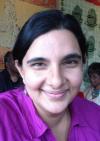Researchers continue to improve outcomes for patients with non-small cell lung cancer (NSCLC) by learning more about the disease and how it interacts with our immune system. Because approximately 20% of patients with advanced-stage NSCLC respond well to immunotherapy treatment, it is critical to develop methods to accurately identify those patients and begin their therapy.
“I have always been curious about the complex interactions between the tumor and the immune system in the context of treatment,” explains Valsamo Anagnostou, MD, PhD, assistant professor of Oncology at the Sidney Kimmel Cancer Center. “And I wondered if the genetic make-up of the tumor could have a strong effect on its response to immunotherapy.”
In her preliminary work, Dr. Anagnostou took a deep dive into sequencing the whole exomes (the protein-coding portions of the genome) in tumors to see if this would help explain the underlying interactions between NSCLC tumors and the immune system. She discovered that the tumor mutational burden (TMB), the number of mutations found in tumor biopsy samples, was not being accurately measured.
The thinking has been that a higher TMB in tumors would result in better outcomes for patients treated with immunotherapy because there would be more opportunities for the immune system to identify the tumor and attack it. However, some studies now question the use of the TMB, as it can sometimes be inaccurate in predicting patient outcomes. Dr. Anagnostou’s research suggested that TMB measurements could be more accurate by taking into account the tumor purity (the degree of non-cancer cells mixed with the tumor sample.)
After applying for and being awarded a coveted Career Development Award from LUNGevity Foundation in 2017, Dr. Anagnostou and her team began working on better ways to predict patient outcomes when treated with immunotherapy.
They started with the TMB calculation. After simulating and in silico diluting mutations from 20,000 tumors, to mimic the effect of tumor purity, Dr. Anagnostou and her team were able to calculate a correction factor to be used with the TMB. “We were able to put the correction into an easy-to-use table. The idea is that once this approach is properly validated, oncologists could take their next-generation sequencing reports and look at the TMB correction table to get the more accurate, corrected TMB value, which will increase the accuracy of predicting the patients’ outcomes to immunotherapy,” explains Dr. Anagnostou.
However, even the corrected TMB isn’t good enough, she says. “It’s too simple. The tumor response is complex and dynamic. Just looking at one value (such as corrected TMB) isn’t enough.”
Dr. Anagnostou and her team identified several factors, in addition to corrected TMB, that could be easily derived from sequence data and used to predict a patient’s response to immunotherapy. Those factors included presence of mutations in specific genes including receptor tyrosine kinases (RTK), smoking-related mutations as well as diversity in human leukocyte antigens (HLA). They combined those factors together to construct a sophisticated computational model to determine whether a patient may respond to immunotherapy. This groundbreaking work was published in Nature Cancer, a highly respected peer-reviewed scientific journal, in January of this year.
Dr. Anagnostou’s approach has been validated in her laboratory, but more testing is needed to confirm that this computational model can accurately predict patient outcomes in larger populations and in a variety of clinical settings.
“I am a medical oncologist, but my goal is to transform the field into molecular oncology. I want to be able to make decisions for patients based on the molecular evidence in their individual tumors,” notes Dr. Anagnostou. “Improving outcomes and saving lives—that is my goal. I believe molecular oncology will get us there.”
Related Reading:
- The Impact of the LUNGevity Career Development Award
- ASCO 2020 and recent lung cancer drug approvals: What it all means for patients
- Research Underway to Improve Immunotherapy Outcomes for ALK-Positive Lung Cancer
 Juhi Kunde, MA, is a science writer for LUNGevity.
Juhi Kunde, MA, is a science writer for LUNGevity.
